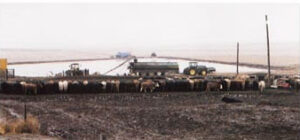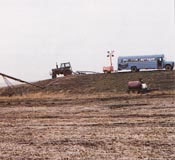 Le Mars, Iowa, U.S.A.
Le Mars, Iowa, U.S.A.
Some 25 miles north of Sioux City, Iowa lies the community of Le Mars, proudly proclaimed the “Ice Cream Capital of the World” by the Iowa State Legislature in 1994 for producing more ice cream by a single company than any other city in the world. Just outside of town, Neal Anthony and his family make their home on a small acreage. Neal has been the owner operator of Anthony Pit and Lagoon for the last three years and has operated a trucking business — mostly grain and refrigerated hauling — for the last ten years.
Neal operates as a licensed manure applicator and services over 200 customers in his area. By treating manure as a resource, the environment is protected and valuable manure nutrients are recycled. “Large scale hog production is definitely on the increase in our area,” says Neal. “The days of the small independent farm operator raising 500 head out in the barn seem to be over. It’s much more common now to have large-volume finishing operations with 1,000 head or more.” One indicator of the large-scale nature of current livestock production is the fact that some of Neal’s cattle-raising customers have tanks that hold in excess of 1 million gallons. The service provided by Neal’s business is to pump out the livestock producers’ pits and lagoons, transport the product in 9500 gallon tanks, and inject the manure into the ground with a disc cover. “Usually we apply the product on the livestock producer’s own land but many producers also sell their manure to neighbouring farms,” says Neal.
Like most long-time rural dwellers, Neal is used to the odors that are an essential aspect of his business. “There seem to be more people complaining these days but they’re mostly city folk who have moved to the country and have some pretty unrealistic expectations. If you live in the country, you have to accept that manure application is an essential part of agricultural production.”
 A valuable insight into North American agricultural practices is being obtained this year in the Anthony household by two exchange students — one from Brazil and one from Germany. These two young men came to Iowa through the Youth For Understanding organization and attend the local high school in Le Mars. “They eat much more than our own two sons (Brendan aged 6, and Tanner aged 3) but my wife, Denise, is getting used to those big grocery bills by now! I think we’re all benefiting from the experience.”
A valuable insight into North American agricultural practices is being obtained this year in the Anthony household by two exchange students — one from Brazil and one from Germany. These two young men came to Iowa through the Youth For Understanding organization and attend the local high school in Le Mars. “They eat much more than our own two sons (Brendan aged 6, and Tanner aged 3) but my wife, Denise, is getting used to those big grocery bills by now! I think we’re all benefiting from the experience.”
Getting results
Neal Anthony is a relatively new user of Power Up products. “Like anyone involved in seasonal work, I am interested in increasing the reliability of my equipment when I need it most and reducing the amount of maintenance that I have to do,” says Neal. When Neal’s local Power Up dealer suggested that Power Up products might help, he was willing to give them a try.
“I operate four Case-IH tractors and four-wheel drives,” says Neal, “and I used to have to service them every 200-250 hours. Since I started using Power Up’s NNL 690, I’ve extended that period to 400-450 hours — that’s a tremendous time-saver for me.” Neal has sent oil samples in for analysis to confirm that his tractors may be safely operated for that period of time before the oil starts breaking down.
Neal has also been pleased with the results of adding Gen 49D with Anti-Gel to his diesel fuel. This fall he has used 55,000 gallons of fuel so he is very interested in any product that can help cut his consumption. “I did a control experiment of running a couple of trucks without adding Gen49D with Anti-Gel to the fuel and they consumed between 20- 30 gallons more per day. That really sold me on the product.”
Not only did the Gen49D with Anti-Gel decrease fuel consumption, it also made it possible for his equipment to operate on fuel that was not of the highest quality. “I buy all my fuel ahead of time and I had contracted to buy 20,000 gallons of fuel this fall from a different supplier. The quality was not as good and the tractors just wouldn’t run unless I used the Power Up fuel additive.”
Another Power Up product that Neal is keen to try is Thixogrease. “We do all our major maintenance in the off-season between December and March,” says Neal. “We’ve been having some trouble with the wheel bearings on our tanks and we plan to re-pack them all with Thixogrease and see if we can’t improve their durability.”
